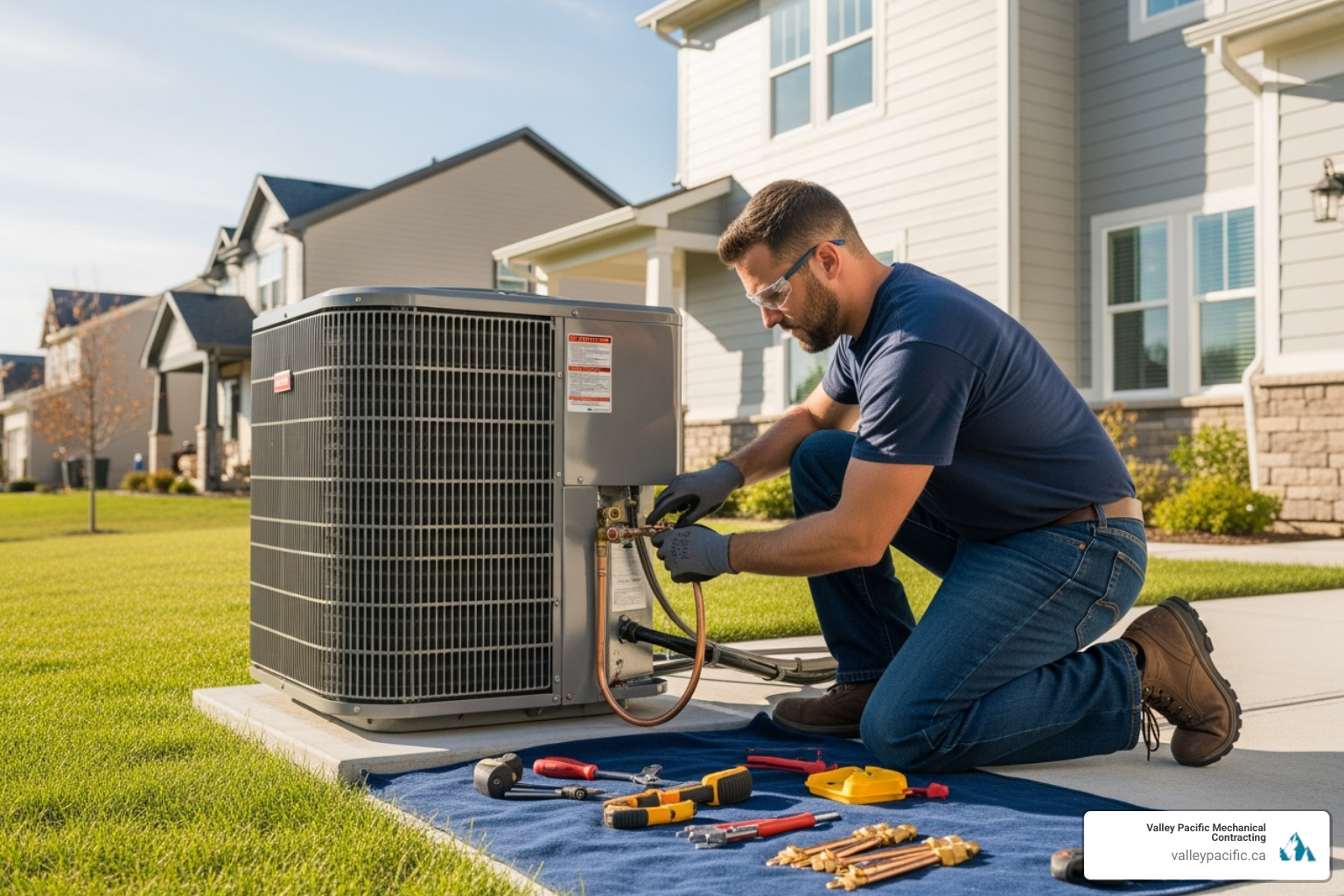Your Home Deserves the Best: An Expert Heat Pump Installation Guide


Why Expert Heat Pump Installation Matters for Your Home
Expert heat pump installation is the foundation of a reliable, efficient heating and cooling system that will serve your home for years to come.
Key Elements of Expert Installation:
- Proper System Sizing - Manual J load calculations ensure your heat pump matches your home's exact needs
- Certified Technicians - NATE or manufacturer-certified installers follow industry best practices
- Quality Connections - Leak-free refrigerant lines and correct electrical work prevent future failures
- Code Compliance - All work meets local building codes and safety regulations
- Thorough Testing - Complete system commissioning and calibration before handoff
- Warranty Protection - Manufacturer warranties often require professional installation
Heat pumps are highly energy-efficient because they transfer heat instead of generating it. However, this efficiency is lost if the unit isn't installed correctly. Every step, from sizing to electrical work, requires professional expertise to prevent underperformance and premature failure.
A modern heat pump can cut your heating and cooling costs by up to 50%, provide year-round comfort from a single unit, and last 10-15 years. But these benefits are only achievable with a proper installation from day one.
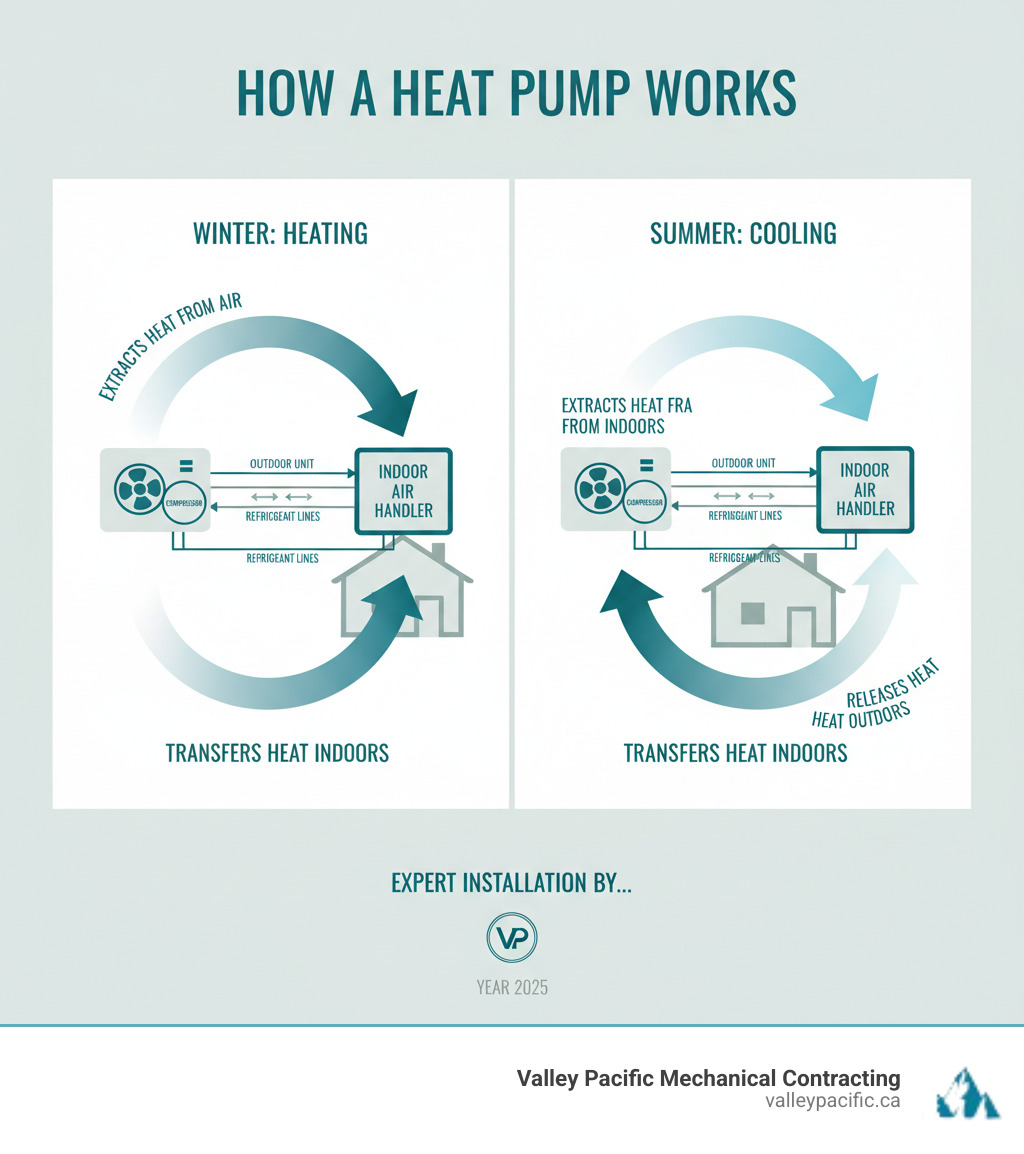
Expert heat pump installation glossary:
The Best Benefits of a Modern Heat Pump System
Heat pumps are changing how homeowners think about heating and cooling, offering benefits that go far beyond just keeping you comfortable year-round.
Heat pumps are an all-in-one solution, replacing separate furnaces and air conditioners. This means less equipment, simpler maintenance, and unified comfort year-round.
Energy savings are significant. By transferring heat instead of creating it, heat pumps can reduce heating and cooling costs by up to 50% compared to older systems.
This efficiency also means a reduced carbon footprint. Since they don't burn fossil fuels and use less electricity, heat pumps are an eco-friendly choice for your home.
Many people are surprised by the improved indoor air quality. Heat pumps filter and dehumidify the air, removing moisture and airborne particles, which is a major benefit for those with allergies or respiratory issues.
You'll also appreciate the quiet operation. Modern heat pumps provide powerful heating and cooling without the disruptive noise of older furnaces.
Homeowners across the Lower Mainland are upgrading to modern heat pumps for consistent comfort, cleaner air, and lower energy bills. With expert heat pump installation and available government incentives, there's never been a better time to make the switch. To learn more, explore these resources: Consider Heat Pump Installation Reasons and our HVAC System Upgrades Complete Guide.
Preparing for Your Installation: Key Factors for Homeowners
A successful heat pump installation depends on choosing the right system for your unique home. That's why a proper expert heat pump installation begins with a comprehensive home assessment. We evaluate your current HVAC setup, home layout, and insulation to match you with the perfect system for your needs and the Lower Mainland climate.
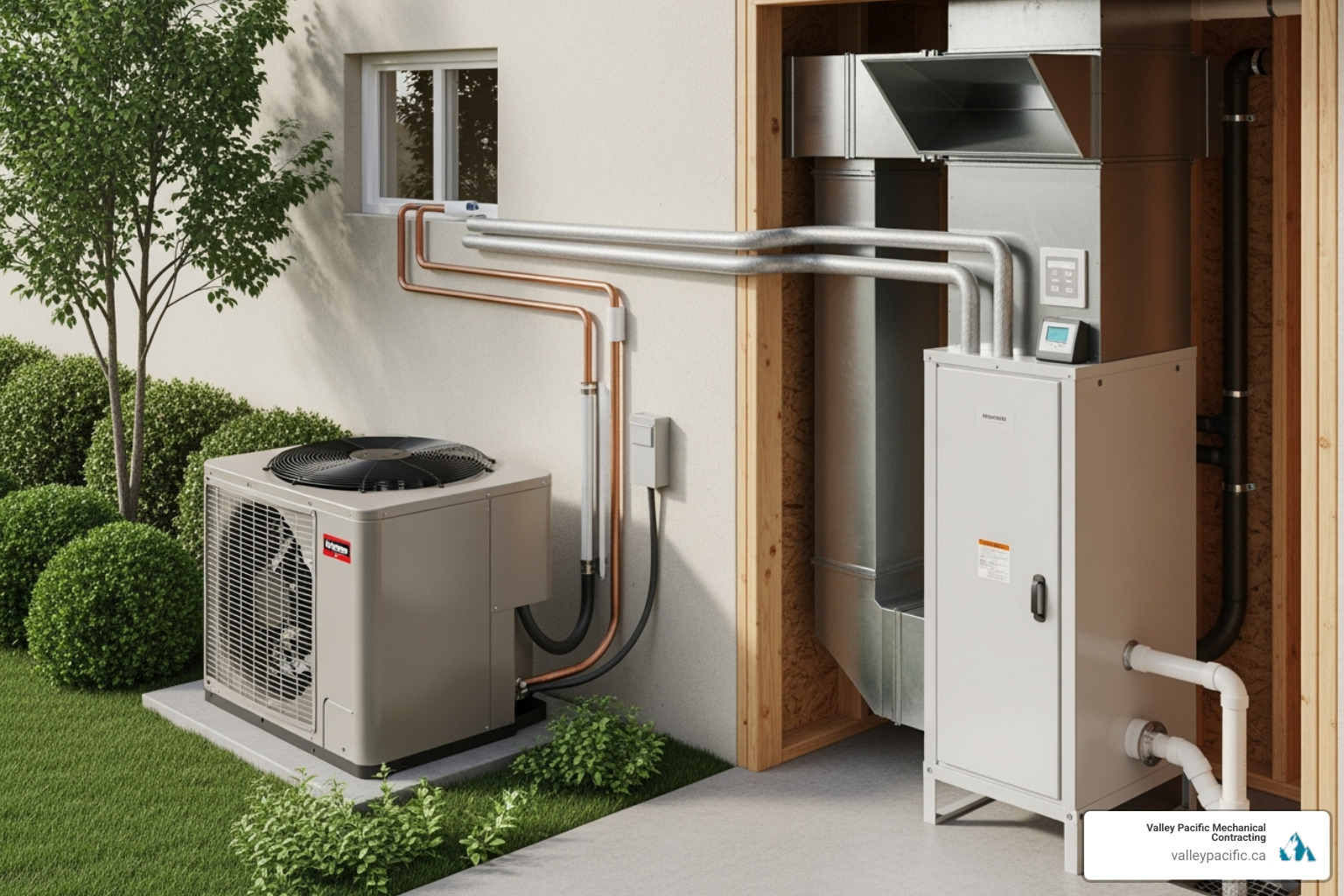
Understanding Heat Pump Types
Heat pumps come in several varieties, and choosing the right one is key to your comfort and energy bills.
Air-source heat pumps are the most popular choice, transferring heat between your home and the outside air. Modern cold-climate models are highly effective, keeping homes warm even in freezing temperatures.
Geothermal heat pumps use the stable temperature of the earth for best efficiency and low operating costs. While the initial investment is higher, they are ideal for long-term homeowners.
Ductless mini-split systems are perfect for homes without ductwork or for zoned heating and cooling. An outdoor unit connects to one or more indoor units, allowing for independent temperature control in different rooms.
Hybrid systems pair an electric heat pump with a gas furnace, intelligently switching between the two for optimal efficiency and reliability in all temperatures. Our guide on Residential Heat Pump solutions can help you explore which type suits your lifestyle best.
Sizing and Efficiency Ratings Explained
When it comes to heat pumps, bigger isn't better. An improperly sized unit, whether too large or too small, will cause problems.
We use a Manual J load calculation—the industry gold standard—to determine the correct size for your home. This analysis considers factors like square footage, insulation, windows, and occupancy to ensure optimal performance.
Two efficiency ratings are key: SEER2 (cooling) and HSPF2 (heating). Higher numbers mean greater efficiency and lower energy bills.
An oversized unit will short-cycle, causing uneven temperatures and premature wear, while an undersized unit will run constantly without reaching the desired temperature. Both waste energy and money. That's why we take sizing seriously—you can read more about this in our article on Why AC Sizing Matters for Installation.
Home and Climate Considerations
Your home's characteristics and our local climate are crucial in selecting the best heat pump.
Cold climate performance is vital in the Lower Mainland. Modern heat pumps are engineered to heat efficiently down to -15°C or lower, with some models including supplemental heat for extreme cold snaps.
Your electrical panel capacity must be sufficient to handle the new system. We'll assess your panel and advise if an upgrade is needed. A federal tax credit can help cover the cost of panel upgrades done with a heat pump installation.
We perform a thorough ductwork inspection to check for leaks or blockages that waste energy. If your home lacks ducts, ductless mini-splits are an excellent alternative.
Home insulation quality is key to efficiency. A well-insulated home allows your heat pump to work less and save more energy. We'll evaluate your insulation during our assessment.
Where you place your heat pump components also affects performance. Our guide on Best Locations for Heat Pump Placement covers this important topic.
The Critical Importance of an Expert Heat Pump Installation
An expert heat pump installation is more than just placing equipment; it's the foundation for years of reliable comfort and energy savings. The difference between a quick job and a quality installation is significant, and it's where professional experience is vital.
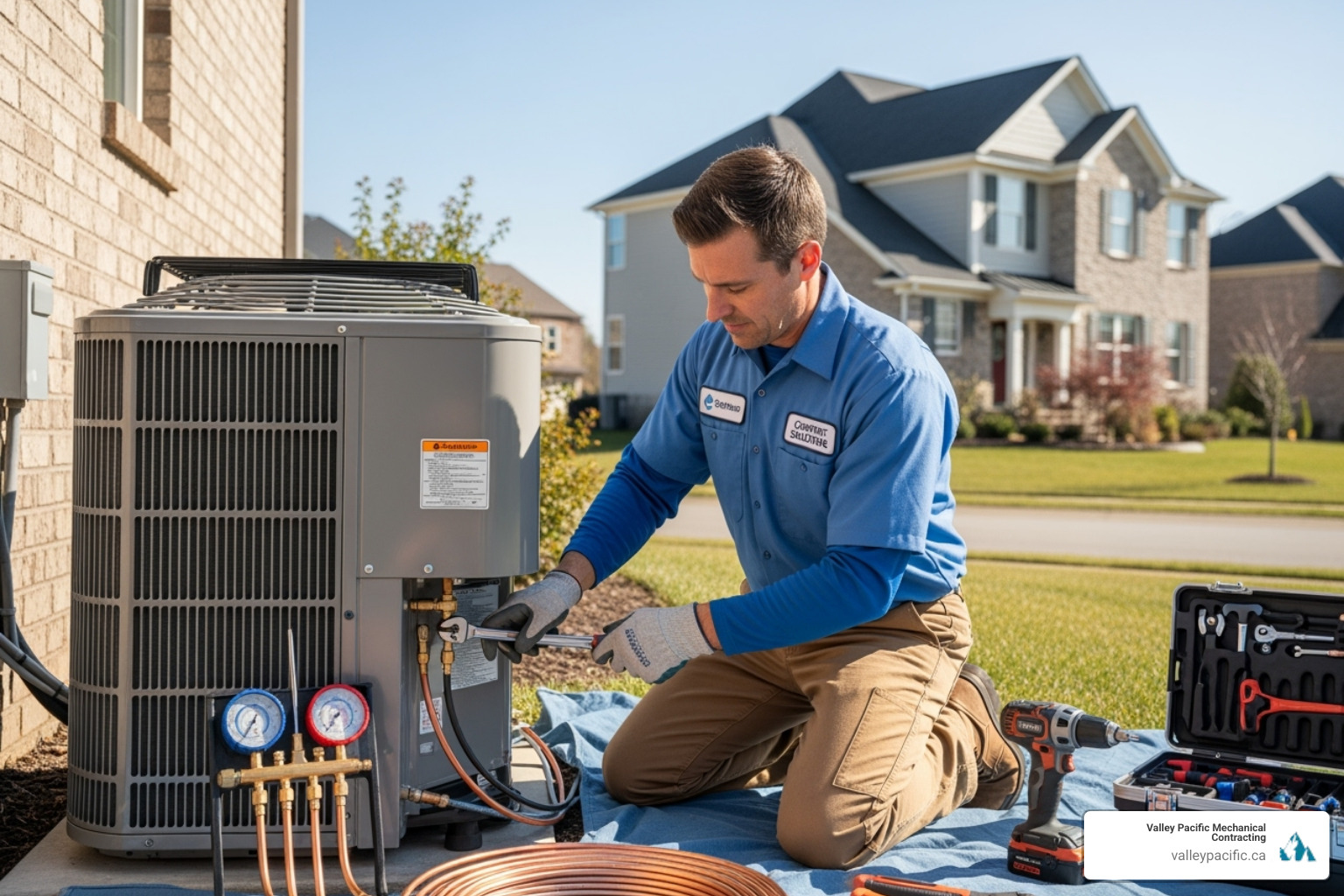
Why an Expert Heat Pump Installation is Non-Negotiable
Even the most advanced heat pump will underperform if not installed correctly. All its benefits depend on a proper installation.
Maximizing efficiency: Proper installation with precise refrigerant calibration and optimized airflow ensures your system operates at its peak rated efficiency, delivering maximum energy savings.
Preventing premature failure: A professional installation can help your system last 12 to 20 years. Cutting corners leads to early breakdowns and costly repairs.
Ensuring safety: Heat pumps involve high-voltage electricity and refrigerants. Professional installation adheres to strict safety protocols to prevent hazards like electrical faults or leaks.
Adhering to local codes: Our certified technicians ensure your installation complies with all local building codes and environmental regulations in Maple Ridge, Langley, and Mission.
Protecting your investment: Most manufacturer warranties are void without professional installation. This protects you from paying for repairs that should be covered. Resources like the Find a trusted Heat Pump Champion Advocate emphasize choosing quality professionals. Our meticulous approach to HVAC System Design ensures every component works together seamlessly.
The Step-by-Step Process of an Expert Heat Pump Installation
Our expert heat pump installation follows a systematic process to ensure quality and a headache-free experience.
- Initial Site Assessment: We examine your home's layout, insulation, ductwork, and electrical system to determine its specific needs.
- Old System Removal: We safely disconnect, remove, and properly dispose of your old equipment and refrigerants.
- Outdoor Unit Placement: We install the outdoor unit on a stable, level pad with proper clearance for airflow and maintenance.
- Indoor Air Handler Installation: The indoor unit is positioned for optimal performance, whether in a closet, attic, or as a wall-mounted ductless unit.
- Refrigerant and Electrical Line Connection: We run and seal refrigerant lines to be leak-free and make all electrical connections safely and to code.
- Ductwork Modifications: If needed, we seal leaks or resize ducts to ensure efficient airflow.
- Rigorous Testing and Calibration: We test refrigerant levels, airflow, and all functions, calibrating the system for peak performance.
- Homeowner Orientation: We walk you through your new system's operation and maintenance.
Most installations wrap up within one to two days.
Telltale Signs of an Incorrectly Installed Heat Pump
An incorrectly installed heat pump will cause problems. Here are the warning signs:
- Uneven temperatures: Rooms are too hot or too cold, often due to improper sizing or ductwork issues.
- Frequent short cycling: The system turns on and off rapidly, indicating an oversized unit or wiring problems.
- Strange noises: Grinding, banging, or hissing can signal loose parts or refrigerant issues.
- Higher-than-expected energy bills: If your bills don't drop, the system isn't running efficiently, often due to poor installation.
- Refrigerant leaks: Look for ice on the outdoor unit or reduced performance. Leaks damage the system and harm the environment.
- Poor airflow: Weak airflow from vents suggests ductwork problems or an improperly installed indoor unit.
If you notice these signs, have a qualified technician inspect your system. Our guide on Signs your Heat Pump needs Repair can help.
Long-Term Care: Heat Pump Lifespan, Maintenance, and Replacement
An expert heat pump installation is the first step. Proactive care is key to ensuring your system provides reliable performance and a long lifespan.
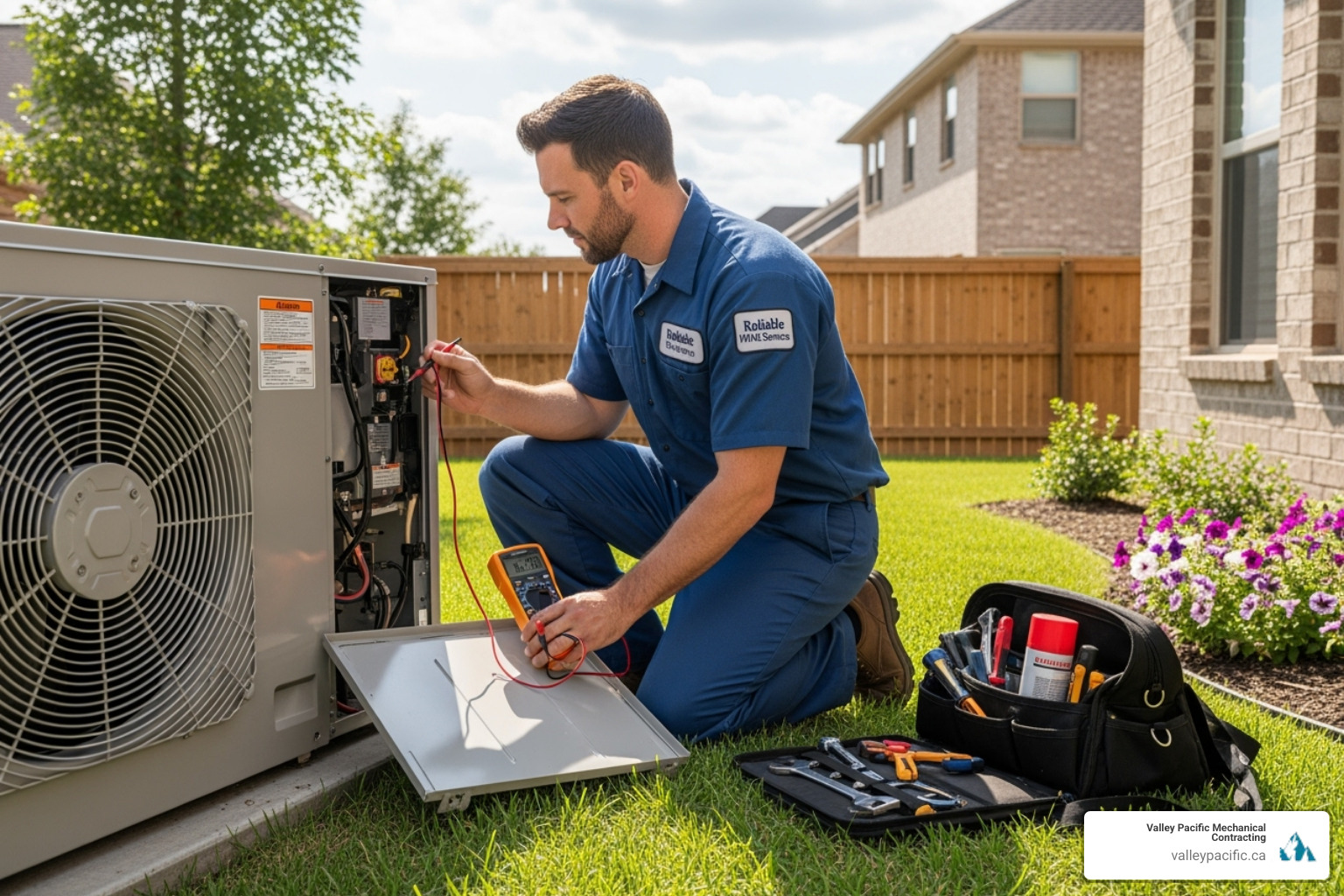
Extending the Life of Your Heat Pump
A well-maintained heat pump can last 10 to 15 years or more. The key is consistent, proactive care.
Annual professional servicing is essential. A yearly checkup allows technicians to clean components, check refrigerant levels, and catch minor issues before they become major, expensive problems.
Between professional visits, you can perform simple DIY tasks. Change air filters every 1-3 months to maintain airflow and efficiency. Also, keep the outdoor unit clear of leaves, snow, and debris, ensuring at least two feet of clearance.
Pay attention to unusual noises or performance changes, as catching issues early saves money. For more guidance, see our Seasonal Heat Pump Maintenance Tips and comprehensive Heat Pump Maintenance guide.
When to Repair vs. When to Replace Your System
Deciding whether to repair or replace an aging heat pump can be tough. Here are key factors to consider:
- Age: If your unit is over 10-15 years old, a replacement will offer far greater efficiency (higher SEER2 and HSPF2 ratings), leading to lower energy bills.
- Frequent repairs: If repair costs are mounting, investing that money in a new, reliable system with a warranty is often more cost-effective.
- Declining efficiency: Rising utility bills or uneven heating and cooling are signs your old unit is losing efficiency. A new system can pay for itself in energy savings.
- Obsolete technology: Modern heat pumps feature advanced cold-climate performance and variable-speed compressors for better comfort and efficiency than older models.
- Major component failure: If a critical part like the compressor fails, the repair can be very expensive. Replacement is often the smarter financial choice for an older unit.
We provide honest assessments to help you make a confident decision. Our goal is to provide the information you need, whether it leads to a repair with our Expert Heat Pump Repair Services or a replacement. Our guide on Is Your Old AC Ready for Replacement offers more insights.
Frequently Asked Questions about Heat Pump Installation
Here are answers to the most common questions we receive about heat pump installation.
How does a heat pump installation differ from a traditional furnace or AC?
A heat pump installation has a few key differences from traditional furnace or AC installations.
- All-in-one system: A heat pump handles both heating and cooling, potentially replacing both your furnace and air conditioner with a single, streamlined unit.
- Outdoor unit requirement: Like an air conditioner, a heat pump has an outdoor component. This is a new consideration if you're transitioning from furnace-only heating.
- Refrigerant lines: These lines connect the indoor and outdoor units, transferring heat to provide both heating and cooling.
- Potential electrical work: Heat pumps run on electricity, so your electrical panel may need an upgrade. A federal tax credit is available through 2032 to help with this cost.
- Reversing valve function: This component is unique to heat pumps. It changes the direction of refrigerant flow, allowing the system to switch between heating and cooling. This versatility is what makes an expert heat pump installation a smart investment.
Are modern heat pumps effective in cold climates like the Lower Mainland?
Yes. While older models struggled in the cold, modern heat pumps are engineered to perform exceptionally well in climates like the Lower Mainland.
- Cold-climate technology: Today's technology allows modern units to extract heat from outside air even when it's well below freezing, operating efficiently down to -15°C or colder.
- Variable-speed compressors: These compressors adjust their output to precisely match your home's needs, maintaining consistent comfort while using less energy.
- Supplemental heat sources: For rare, extremely cold days, many heat pumps can be paired with supplemental heat sources, like built-in heat strips or a hybrid furnace setup, ensuring your home always stays warm.
- High HSPF2 ratings: We recommend systems with high HSPF2 (Heating Seasonal Performance Factor 2) ratings, which indicate superior heating efficiency and year-round reliability in our climate.
What role does my existing ductwork play in a new heat pump installation?
Your home's ductwork is critical for distributing conditioned air, and its condition directly impacts your new heat pump's performance.
- Ductwork inspection: Before installation, we conduct a thorough ductwork inspection to identify any leaks, blockages, or damage that could compromise performance.
- Sealing leaks: Sealing leaks is crucial. Even small gaps can waste a significant amount of energy and reduce comfort by allowing conditioned air to escape.
- Ensuring proper size: We also verify that your ducts are the proper size for the new system. Undersized ducts restrict airflow, forcing the system to work harder and less efficiently.
- Airflow optimization: Part of an expert heat pump installation involves airflow optimization, which may include adjustments to ensure balanced comfort in every room.
- Ductless options: If your home has no ductwork or the existing system is in poor condition, ductless options like mini-split heat pumps are an excellent, highly efficient alternative.
Conclusion: Partner with the Experts for a Headache-Free Experience
Choosing an expert heat pump installation is an investment in your home's comfort, efficiency, and value. As we've covered, modern heat pumps offer incredible benefits, but they all depend on a high-quality installation.
Professional expertise is the difference between a system that performs flawlessly and one that causes constant problems. Proper sizing, correct connections, and adherence to codes are non-negotiable for preventing future repairs and maximizing performance.
For over 30 years, Valley Pacific Mechanical Contracting has served the Lower Mainland, including Mission, Maple Ridge, and Langley. Our certified technicians understand our local climate and provide a headache-free experience from start to finish. We back our work with the Daikin Comfort Promise and offer 24/7 emergency service.
Your home deserves the best. If you're ready to upgrade to a more efficient and reliable comfort system, we are here to guide you.
Ready to experience the difference that professional installation makes? Contact us for your expert heat pump installation in Maple Ridge today. Let's work together to create the comfortable, efficient home you've been dreaming of.




